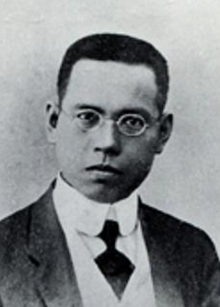Proceso Gabriel
Dr. Proceso Gabriel | |
|---|---|
 | |
| Born | July 2, 1887 |
| Died | November 4, 1935 (aged 48) |
| Nationality | Filipino |
| Citizenship | Philippines |
| Alma mater | University of Santo Tomas |
| Known for | establishing first bacteriological laboratory in the Philippines |
| Spouse | Carmen Borja |
| Parent(s) | Juan Gabriel (father) Juana Bautista (mother) |
| Scientific career | |
| Fields | bacteriology, pharmacology, parasitology |
| Institutions | Philippine Bureau of Health University of Santo Tomas |
Dr. Proceso Bautista Gabriel (2 July 1887 – 4 November 1935) was a Filipino physician and bacteriologist known for establishing the first privately owned bacteriological laboratory in the Philippines.[1][2]
Biography
Early life
Gabriel was born on July 2, 1887, in Santa Cruz, Manila, the second of five children of Juana Bautista and Juan Gabriel, a leather dealer.[1][2]
Medical career
After finishing medical studies at the University of Santo Tomas on January 14, 1903, Gabriel worked as a lecturer at the university while serving as Manila's municipal physician. He was among the first graduates of the first medical school in the Philippines together with José Rizal, Aristón Bautista, Manuel S. Guerrero, Trinidad Pardo de Tavera, Salvador Vivencio del Rosario, Sixto de Los Ángeles and others.[3] While practicing his medical profession, he conducted researches on fighting the great epidemics of cholera, smallpox, beriberi, and typhoid fever.[1] He became the head of the Philippine Bureau of Health and assistant Dean at the UST Faculty of Medicine and Surgery. During his 20 years with the Bureau of Health, he published numerous medical researches and textbooks such as Manual de Higiene y Sanitación ("Manual on Hygiene and Sanitation") and Higiene Práctica y Métodos Clínicos de Laboratorio ("Practical Hygiene and Clinical Laboratory Methods").[3][1]
Marriage and family
Gabriel married Carmen Borja on November 26, 1905. Together they had five children who became prominent figures in their respective professions:[2]
- Dr. Antonio (born ?), head of the Department of Preventive Medicine and Parasitology and chief of the Section of Legal Medicine and History of Medicine, UST Faculty of Medicine Surgery;
- Sis. Maria Carmencita (1910–1998), professed religious of the Maryknoll Sisters;[4]
- Dr. Gregorio (born ?), assistant dean and chief of the section of Anatomy of the UST Faculty of Medicine and Surgery;
- Dr. Pedro (born ?), chief chemist of YCO Paints, Elizalde & Company, Inc, and professor of philosophy, University of Santo Tomas; and
- Angel (born ?), assistant vice-president of F.G.U. Insurance group.
A devout Roman Catholic, he and his wife were members of the Third Order of Saint Dominic.[1][2]
Death
He died on November 4, 1935, due to heart failure in Manila.[1]
Honors and recognitions
In 1929, he was nominated for the Nobel Prize in Physiology or Medicine by Dr. Dario del Val of the University of Santo Tomas "for his contributions to the public health and the sanitary progress of the Philippines." He was the first Filipino to be nominated for the Nobel Prize.[5]
References
- ^ a b c d e f "Proceso Gabriel (1887–1935)". oocities.org. Retrieved 15 March 2023.
- ^ a b c d Cymbeline R. Villamin. "Biographies of Early Scientists in the Philippines" (PDF). scinet.science.ph. Retrieved 15 March 2023.
- ^ a b "The First Graduates of the Faculty of Medicine and their Impact on Medicine in the Philippines". anargyroifoundation.org. 27 November 2020. Retrieved 15 March 2023.
- ^ "Sister Maria Carmencita Gabriel, MM". Maryknoll Mission Archives. Retrieved 15 March 2023.
- ^ "Nomination Physiology or Medicine 1929". nobelprize.org. Retrieved 15 March 2023.


